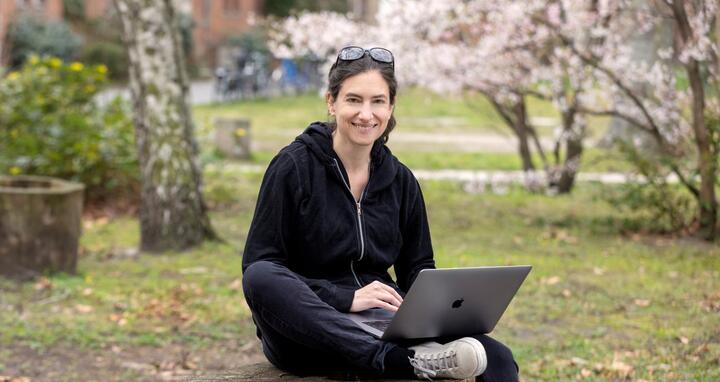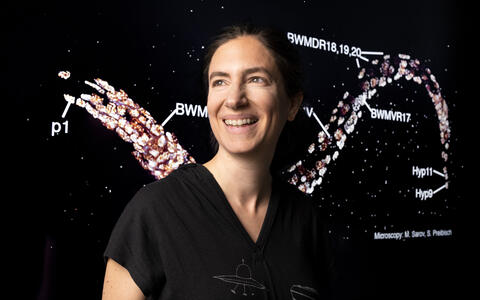Dagmar Kainmüller receives professorship
Different problems don’t necessarily require different solutions. Take computational image analysis, for example: algorithms designed to analyze microscopy images of tissue samples can also evaluate images of geological structures. This type of method transfer is exactly what computer scientist Dagmar Kainmüller is aiming for. She and her team at the Max Delbrück Center have so far concentrated primarily on developing techniques for processing and evaluating biomedical image data. “Going forward, our efforts to advance transferable computational analysis methods will include an even greater focus on creating synergies with other fields of research,” says Kainmüller.
This emphasis is the driving idea behind Helmholtz Imaging’s new Science Unit at the Max Delbrück Center, which Kainmüller will head. Helmholtz Imaging strives to unlock the potential of imaging and data analysis across the Helmholtz Association and to push forward innovative imaging techniques (see box below). This will strengthen collaboration between centers and produce research synergies. “We want to develop a generic methodology for the entire imaging pipeline – from measurement to insight,” says Kainmüller, explaining the motivation for the initiative.
Professorship connects the institutions
The Helmholtz Association’s establishment of the Science Unit at the Max Delbrück Center is linked to a W3 professorship that includes a research group. Kainmüller’s new leadership role therefore comes with a professorial position at the University of Potsdam’s Digital Engineering Faculty, specifically in the field of integrative imaging data science – a field that studies various methods for analyzing image data as well as general approaches to image processing.
“I haven’t finalized the curriculum yet,” reports Kainmüller. “But the course is going to be along the lines of ‘Machine Learning for Imaging Analysis’” – a subject she has already taught at Humboldt-Universität zu Berlin. The main focus will be on self-learning AI algorithms capable of carrying out the automated analysis of large image data sets.
The AI’s predictions are already better than random distribution. The AI works like a black box.
Kainmüller’s research group at the Max Delbrück Center employs such machine learning methods on microscopy images to investigate, for example, the spread of infection in tissue or the development of metastases in cancer patients. One question that AI may be able to answer in the future is what is the likelihood of metastases forming. “The AI’s predictions are already better than random distribution,” she reports. However, it is not known exactly where the programs draw the information from. “The AI works like a black box,” says Kainmüller.
Going forward, she and her team also hope to develop bioinformatics methods that can be used to analyze the complete genetic or molecular profiles of humans and other organisms. Scientists refer to this as omics data – these are data sets that contain information such as the entirety of a cell’s genes that have just been transcribed. In the future, AI algorithms could, for example, use them to find out how complex interactions between genes influence the course of certain diseases. “Such in-depth analyses would open up entirely new avenues in personalized medicine, which involves tailoring treatment to the individual patient,” says Kainmüller.
Text: Janosch Deeg
- Helmholtz Imaging
-
Further information →
-
Image data comprise a substantial part of the data generated in scientific research. Helmholtz Imaging aims to unlock the potential of imaging in the Helmholtz Association, with imaging understood as the whole process from data acquisition and data preparation to data management and data analysis. Three host centers – the German Electron Synchrotron (DESY), the German Cancer Research Center (DKFZ), and the Max Delbrück Center – collaborate under the banner of Helmholtz Imaging in order to generate the greatest possible added value for the entire Association. The creation of this overarching platform enables the Helmholtz Association to better leverage its innovative methods and data treasures and make them accessible to everyone. Helmholtz Imaging is one of five platforms, alongside HIDA, HIFIS, Helmholtz.AI and HMC, initiated by the Helmholtz Information & Data Science Incubator.
Further information
- All of Helmholtz benefits from HIP
- Helmholtz Imaging
- The image analyst – a portrait of Dagmar Kainmüller
- Image Data Analysis Platform







